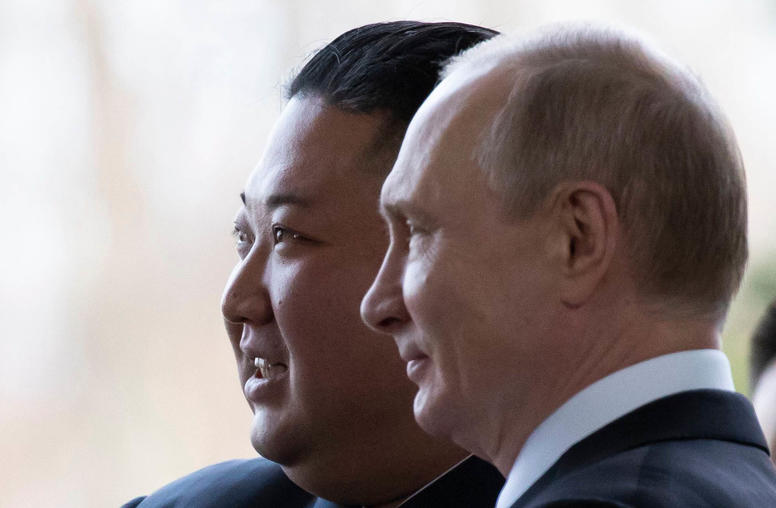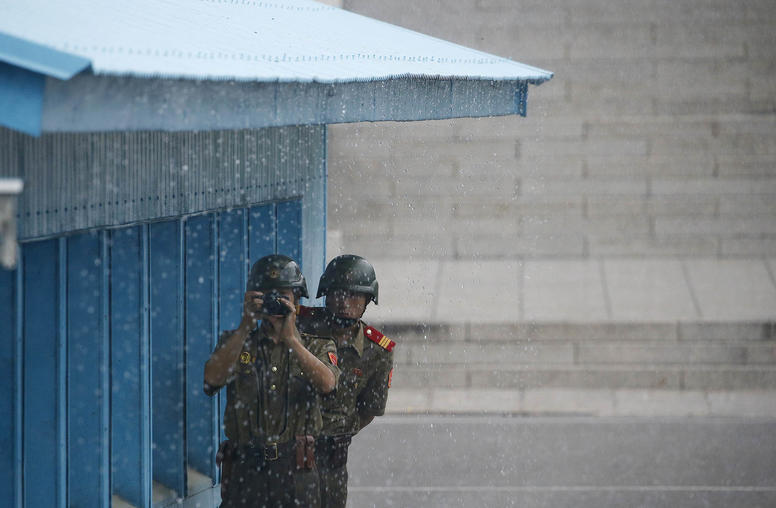Mr. Lee Goes to Washington
John Park, a senior program officer who directs USIP’s Korea Working Group, analyzes prospects for South Korean President Lee Myung-bak’s state visit to the United States October 13.
October 12, 2011
 John Park, a senior program officer who directs USIP’s Korea Working Group, analyzes prospects for South Korean President Lee Myung-bak’s state visit to the United States October 13. A stalwart U.S. ally with increasing global reach, President Lee will be granted the rare privilege for a foreign head of state: addressing a joint session of Congress. Under the leadership of both presidents, the U.S.-South Korean alliance has been a key factor in preventing conflict on the Korean Peninsula by keeping a belligerent North Korea in check.
John Park, a senior program officer who directs USIP’s Korea Working Group, analyzes prospects for South Korean President Lee Myung-bak’s state visit to the United States October 13. A stalwart U.S. ally with increasing global reach, President Lee will be granted the rare privilege for a foreign head of state: addressing a joint session of Congress. Under the leadership of both presidents, the U.S.-South Korean alliance has been a key factor in preventing conflict on the Korean Peninsula by keeping a belligerent North Korea in check.
- What’s the significance of President Lee’s state visit?
- What’s the state of the U.S.-South Korean alliance?
- How are both allies currently dealing with North Korea?
- How is USIP contributing to efforts to prevent conflict on the Korean Peninsula?
What’s the significance of President Lee’s state visit?
On the eve of entering the last year of a single five-year term, President Lee’s address to Congress will not only mark the affirmation of the close security ties between two allies, but also the long-anticipated ratification of a landmark free trade agreement. In many respects, the state visit is intended to profile the major strides that both allies have achieved towards realizing the Joint Vision Statement that Presidents Obama and Lee unveiled in June 2009.
Amid setbacks and chronic challenges in almost every major region, Washington views South Korea as a linchpin on a global scale. From hosting the G20 summit in 2010 to preparing to host the next Nuclear Security Summit in 2012, South Korea has been establishing itself as a global partner in addressing common challenges, ranging from rebalancing the international economy to preventing the use of nuclear materials for terrorist attacks. For President Lee, the state visit is an important opportunity to demonstrate South Korea’s unique role as a bridge between the developed and developing countries.
What's the state of the U.S.-South Korean alliance?
Confronted by a series of direct attacks from North Korea on South Korea in 2010, the U.S.-South Korean alliance has emerged stronger and more robust in preserving peace and stability in the region. The U.S.’s steadfast support of its ally demonstrated that the U.S. is a resident power in the Asia-Pacific region. While security analysts believe that this enhanced defense posture has kept North Korean provocations in check, it has elicited a strong reaction from China, which views the deployment of the USS George Washington aircraft carrier group as a military capability that also threatens Chinese territory. Indeed, an unintended consequence of the U.S.’s increased support of its South Korean ally has been growing security tensions between Washington and Beijing.
With respect to the U.S. military base relocation activities in South Korea, the consolidation of U.S. Forces Korea in a central hub in Pyeongtaek is moving forward. By the end of this relocation, wartime operational control of South Korean military forces will transfer from the U.S. to the Seoul government. This process is in direct contrast to the planned relocation of U.S. forces in Japan from Okinawa to the U.S. territory of Guam.
How are both allies currently dealing with North Korea?
South Korea is currently seeking to make tactical adjustments to its North Korea policy in order to deter future North Korean provocations and do so in a sustainable manner that will transfer to the next South Korean administration. While peaceful denuclearization of North Korea remains a central goal of the Lee Myung-bak administration, the priority objective is preventing another North Korean attack. As recent inter-Korean talks in Beijing demonstrated, however, the gap between Seoul and Pyongyang remains wide. The opacity of the North Korean leadership succession process is adding another layer of complexity to an already difficult predicament.
Following an exploratory meeting with the North Koreans in New York in July, the U.S. has moved forward with additional bilateral talks aimed at restarting work on the recovery of U.S. servicemen’s remains in North Korea from the Korean War. A key conclusion in Washington appears to be that whenever the U.S. is engaged in talks with Pyongyang, the North Koreans refrain from provocations and brinkmanship. Keen to avoid another dangerous escalation of tensions on the Korean Peninsula, Washington is proceeding with its limited tactical engagement of Pyongyang while adhering to its broader policy of strategic patience.
How is USIP contributing to efforts to prevent conflict on the Korean Peninsula?
Given frequent leadership changes and rapidly evolving security, political, economic and environmental challenges in the region, the U.S. and its Northeast Asian counterparts increasingly lack the capacity for sustained analysis, development and implementation of policy approaches to prevent conflicts. USIP launched and convenes recurring Track 1.5 policy dialogues – like the Korea Working Group – with current and former policymakers and advisers. They facilitate three things: a deeper understanding of complex policy issues, early direct crisis communication, and the development of prevention initiatives and strategies. By generating feedback on early-stage policy proposals developed and discussed in USIP’s Track 1.5 meetings, we have been able to increase the likelihood of traction at the Track 1 level.
Explore Further
- Countries and Regions: Korean Peninsula
- USIP’s Korea Working Group
- The U.S.-North Korea “Exploratory” Meeting in New York: Why Now?
On the Issues by John Park | July 28, 2011



